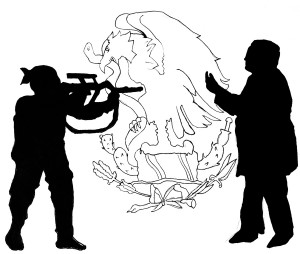Mexico must fight drugs more vigorously
Since taking office last December, Mexican President Enrique Peña Nieto has shown that he means business in the ensuing war against drug cartels. The capture of Miguel Angel Treviño Morales, the leader of the Zetas cartel, in July is a serious victory and shows that Mexico is focusing more on high-level traffickers and killers — the people most responsible for the violence, according to the Wall Street Journal. The government must continue to adapt its approach to drug violence in order to focus on preventative policing instead of responding to violence with more violence.
In response to the 90,000 dead in the seven-year war on drug cartels started by the Felipe Calderón administration, the Mexican government has been rapidly increasing the capability levels of police forces deployed to fight against the cartels. Ten thousand of these national police, whose creation was announced by Peña Nieto’s administration last December, resemble Special Forces soldiers more than they do beat cops. The United States has provided assistance in waging this war, giving these troopers CIA training and flying unmanned aerial drones to provide scouting and intelligence reports on cartel movements, according to The Atlantic.
But the advances that the Mexican government has made militarily against cartels will not stop the violence unless the government follows up these military gains with beat-cop policing. In industrial cities such as Ciudad Juarez, which in 2009 had the dubious honor of being the most violent city outside a war zone, according to the Houston Chronicle, Mexican army troops and federal police forces make regular sweeps to target armed bands of cartel drug runners and thugs; yet there are no beat cops to create sustained law and order in the cities afterward. According to Australian counterinsurgency expert David Kilcullen in his book The Accidental Guerilla, constant monitoring is the only way to stop these kinds of criminal elements from gaining a foothold in cities such as Juarez and thus keep the peace.
Granted, the war on drugs has a long history of leaving police officers and their families regularly targeted for executions by the cartels in an attempt to intimidate local cops and encourage them to stay out of the fight against cartels. And though the streets of Juarez were too violent and dangerous for beat cops even just four years ago, sustained efforts by the ultra-trained and heavily armed national police have made the streets just safe enough for beat cops to return to patrolling for crime. The return of regular cops is a long-awaited step in Mexico’s war on drug gangs.
Their arrival and subsequent return to normalcy is long overdue that Mexican vigilante squads have begun to form to defend their towns and provide some law and order, writes the Foreign Affairs. Only real cops with training in working with local communities can ensure that drug cartels can never again gain a foothold with the local population.
Cartels and drug-related careers can be appealing in Mexico. Though Mexico’s industrial sector has benefitted magnificently from the increased trade with the U.S. through the North American Free Trade Agreement and movement of industrial products through Juarez, citizens in the rural farming communities of Mexico have been left behind by the rapid industrialization. Naturally, Vanda Felbab-Brown says in her book, Shooting Up, that it’s natural that people with the fewest job opportunities but with farming experience and equipment are willing to begin growing drugs. Similarly, youths attracted by the cartel lifestyle and by the glorification of crime by narcocorrido (folk music with lyrics on the subject of drugs, violence, revolutions and more) rappers are willing to trade bleak job prospects and a failing education system for macho weaponry and the chance to earn a fantastic living running cocaine through South America and into the U.S. A return to regular policing will give communities and educators the chance to improve the otherwise failing Mexican infrastructure enough to give rural communities better opportunities in legitimate trades. Regular policing represents a return to normalcy and an opportunity for economic growth.
The only way for Mexico to maintain the hard-won gains against violent cartels is to bring back regular policing. Otherwise, the pull of the drug lifestyle is too strong and the violence will continue.
Follow Dan on Twitter @ginger_breaddan
Dan Morgan-Russell is a sophomore majoring in international relations (global business). His column “Going Global” runs Mondays.


Young man. You touch on an incredibly weighty subject. And like most, you have no idea what you are talking about. Mexico’s is not an issue with drugs; it’s a problem of poverty, corruption and globalization in which your own government is complicit above all others. It’s not a war on drugs as far as the U.S and Mexico are concerned. It’s a war for drugs. Without drug money Mexico goes bankrupt and the U.S loses DEA, and large portions of other national security agencies. Read Charles Bowden’s Murder City. Mexico is no sovereign political mechanism. It is run by a one cartel and it’s muscle criminal organization called the Mexican Army which is financed by 1 bln Merida dollars in annual U.S money.
U.S citizens need to lay off the crack pipe. If there is no demand there is no supply. U.S citizens and their insatiable appetite for drugs victimizes the people of Mexico. What the U.S needs is Columbia a neighbor.